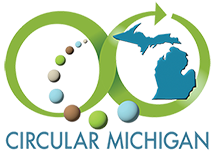FREQUENTLY ASKED QUESTIONS
A Producer Responsibility bill will:
- Provide convenient recycling for all Michiganders. This policy will provide free, convenient recycling to all Michiganders, and develop a consistent statewide list of what can be recycled.
- Support Michigan businesses by creating a more resilient domestic supply of raw materials. Businesses depend on robust supplies of metal, paper, plastic, and glass needed to make new packaging and products. Meanwhile, Michigan buries over 17 million tons of waste in our landfills every year. By recycling more, we can create a reliable local supply of recycled metal, paper, plastic, and glass for manufacturing.
- Reduce climate pollution. Every ton of material recycled saves nearly three tons of carbon emissions.
- Save money for local governments. Producer responsibility for packaging and paper products can reduce the amount money local governments currently spend to operate curbside recycling programs or recycling drop-off centers, potentially saving significant taxpayer dollars each year.
- Reduce unnecessary packaging and reduce plastic pollution. Companies will be charged based on the amount and type of packaging used. The less packaging a company uses, the less they will pay. There are also incentives to move companies toward using more reusable and recyclable packaging.
- Improve equity in recycling statewide. Recycling is generally more convenient in affluent communities and among single-family homes. Most apartment residents lack onsite recycling services, creating a service inequity between single-family homes and multi-family residences. Many communities cannot afford to provide recycling drop-off centers and rural areas face significantly higher costs. This policy will create a sustainable funding system to support convenient, equitable recycling for all residents, regardless of income, housing type, or demographics.
Producer Responsibility programs are in place in over 40 countries and provinces, and some have been around for nearly three decades. All of the available evidence shows that Producer Responsibility programs do not lead to a noticeable increase in consumer prices based on research on similar programs throughout Canada and Europe. Since the cost to companies required to participate typically works out to be fractions of a penny per container, Producer Responsibility programs do not directly cause increased prices for consumers. According to Forbes, there are many factors currently contributing to inflation and rising prices for consumers. This includes shortages in the supply chains due to the pandemic and the increased costs of labor. These factors have a far greater impact on the price of goods than the funding used to support recycling, and increasing the reliable supply of recycled material may even help reduce future costs to producers.
This policy is supported by a broad, bipartisan coalition, including:
- Local governments from around the state that want to provide better recycling services and reduce costs
- Recycling industry members who want to make recycling more consistent, cost-effective, and financially sustainable for all Michigan residents and businesses
- Consumer goods companies that want to improve the sustainability of their packaging and secure more recycled materials to use to make their products
- Environmental organizations and other nonprofits that want to reduce climate pollution, unnecessary plastics, and overall waste
In addition, over 100 global companies have publicly stated that Producer Responsibility policies are a necessary part of the solution to increase recycling, reduce plastic pollution, and help strengthen local economies.
- Over 40 countries and provinces have Producer Responsibility policies for containers and packaging materials. Leading Canadian and European programs have recycling rates up to 85%, compared to Michigan's current rate of 21%.
- Maine and Oregon adopted the first US policies for Producer Responsibility for packaging in 2021. California and Colorado followed in 2022 and 2023 and numerous states are working on producer responsibility policies in 2024.
Producer Responsibility policies can cover a wide variety of materials and as with any policy must be passed through the House and Senate and signed by the Governor to be put into law. This process can take anywhere between 9 months and several years.
- This policy identifies a list of covered material which includes packaging, a packaging-like product, or a paper product.
- Containers covered under the Michigan Deposit Law are exempt from this policy and managed under a different law.
- Compostable packaging will be considered "covered material" and producers of products using this type of packaging will have to pay into the system.
- It is likely that these funds will be used to offset the cost of collecting and composting of these types of covered materials in the larger organic management system.
- Currently consumers and local governments assume responsibility for the environmental impacts and costs of products at the end-of-life.
- Producer Responsibility policies connect the producers to the lifecycle impacts of their products and assure that market signals get back to the producer and influence product and packaging design.
- Producer Responsibility requires producers to pay into a system based on the products, packaging, and waste generated.
- This fund is used to pay for recycling services, off setting the cost of integrated waste management services for consumers and local governments.
- In many cases, nationally and internationally recognized brands are responding to external pressure and making their own commitments to reducing the environmental impacts of their products and packaging.
- Many brands are making commitments to reduce waste, use more recycled material in production, use less toxic components, and generally reduce the environmental impacts of their products. To accomplish these goals they recognize the need to work collaboratively to assure they have the services needed and access to a robust supply recycled material.
- International brands are already working under Producer Responsibility systems in Europe, Canada, and 39 other countries.
